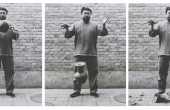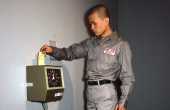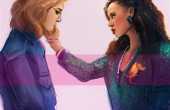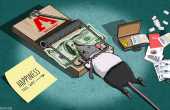Kaya
I'm a cultural researcher and arts educator. I explore and write about performance art in Eastern Europe and beyond.
Contributor II
- Plebian Penman
- Lurker
- Pssst
- Sharp-Eyed Citizen
- Town Watch
- Art Collector
- Article of the Month
- ?
- Articles
5 - Featured
4 - Comments
19
- Ext. Comments
12 - Processed
13 - Revisions
12
- Topics
8 - Topics Taken
1 - Notes
13
- Topics Proc.
9 - Topics Rev.
2
- Points
1120 - Rank
135 - Score
547
Latest Articles
Latest Topics
The History and Impact of Modern CartoonsAnalyse the development of modern cartoons and animations. What impact might they have on young children's perception of the world – whether that is related to how a certain animal/person/character looks like (their visual representation), or whether it impacts behaviours in a certain way. How might kids react to certain characters and relationships portrayed on the screen? Can some of these have a perceptible negative impact on their lives? As a starting point, trace the development of cartoons (from Disney, to Cartoon Network, etc) and some iconic shows.
|
Poetry and Art: How is poetry integrated into contemporary visual art?Analyse the different ways written and/or spoken word and poetry gets integrated into visual art pieces. These can be artworks where words are used as a visual cue, as an integral part of a performance narrative or any other way. What is the link between the sound and image of a word/poem? What effects does it produce on the viewer/listener? Can words be used as a visual element only? Examine instances where classical poems are reworked through a ontemporary lens and reused in a modern context.
|
'Breakfast at Tiffany's': A Feminist ApproachThe 1958 novella by Truman Capote 'Breakfast at Tiffany's' offers its readers a sneak peek into the lavish lifestyle of early twentieth century New York. The main protagonist, however, had become the centre for much debate among feminists. This topic would entail a balanced analysis of the character of Holly Golightly – is she the source of empowerment for women through liberating herself in the ways described in the book? Or is her personality simply an archetype, a false stereotype for a certain demographic of women?
|
The Female GazeDiscussions around the male gaze (in art and elsewhere) are present within the Western socio-political, cultural and artistic milieu since a very long time. What about the female gaze – something which is becoming more and more powerful and evident in the 21st century? I would like to leave this topic relatively open so that writers can choose their own angle from which to hadnle it. I would be interested to see whether people examine this issue from a certain political stance, from a gender studies' perspective or from a more traditional pathway of looking into painting and photography, for example. I believe there is a lot to be said regarding the representation of women nowadays – in art, in films, on TV, in literature…the female figure is becoming more independent, having agency over her own body and her own gaze. What changes (if any) does this bring into the mechanisms of production, and consequently consumption, in pop culture?
|
Action Painting: Conception and LegaciesAnalyse the birth and develpment of action painting as an art movement and look at some of the examples which followed on from it. Jackson Pollock is the person primarily associated with this movement but there are a lot of other artists who were working in this mode as well. Raise questions about its form, concepts, potentialities and the critical and effective work which are inhabiting this style.
|
Choice and Consequences in the Series 'Tokyo Ghoul'This is a proposition for the analysis of making choice and facing consequence in the anime (or the manga) series 'Tokyo Ghoul'. The character of Ken Kaneki can be taken as the main vehicle for exploring the philosophical idea of personal choices and the effects one has to face based on them. It can also be explored from a psychological stance, especially through delving into the divided identity of the protagonist in 'Tokyo Ghoul:re".
|
Existential and Philosophical Questions in 'West World'The new HBO series 'West World' is a striking example of a deeply philosophical reflection of the world we live in. It poses questions regarding the existence of God, who or what is he? Are people able to 'play' God? Is there another world, one which is invisible for us? Or maybe countless dimensions? Are our everyday lives just a meaningless form of existence or is there a deeper meaning to everything? The series suggests that everything happens for a reason and people can, after all, control their own destiny.
|
Modern Cinema: Are Movies Becoming Just a Bunch of Special Effects?We all admire the new techniques and special effects in movies we see in the cinema, but is there actually any value in them? You walk out of the cinema with your eyes full and your head empty. Are movies adopting a purpose just for entertaining? Films from the past, like Luc Besson's Leon, or Blade Runner, or even Forrest Gump carry lots of food for thought, a vast emotional landscape and deserve to be called true works of art. Can we say the same about movies nowadays?
|
Latest Comments
| …But is it 'Art'? | |
That’s exactly how this article starts – an acknowledgement of the importance of contextualisation 🙂 | …But is it 'Art'? |
As someone who doesn’t use TikTok, and is not even tempted, it’s intereseting to learn that there is actually some significant work being done on the platform. I wonder why has this trend stayed only on TikTok, can a similar phenomenon somehow appear on Instagram too for example? | BookTok Influencers and Their Impact on the Publishing Industry |
It’s amazing how different perpsectives and elements become visible every time you watch a good piece of film. That’s the secret to powerful and effective art – being able to present a lot of underlying arguments at once. A reminder I need to re-watch the movie again! | Spirited Away as Social Criticism |
An interesting take on a topic that should be talked about more. It’s a difficult one because there hasn’t yet been a unified ‘explanation’ of the idea of ‘good art’ or even ‘art’ as it is, not to mention how complicated it gets when we bring that discussion to the digital realm. | Why Should We Separate Real Art From NFTs of the Bored Ape Yacht Club Type? |
In different ways. For example, he had a friend, or more like a “co-facilitator”, who was helping him out during Cage piece. There is more information on the day- to- day details in the book ‘Out of Now’ which I’ve cited, if you’re interested. | Tehching Hsieh: The Experience of Time and Duration in Performance Art |
Yes 🙂 | Gavazov and the Eastern European Art Scene |
A very interesting analysis. I was wondering, does the fact that ‘Game of Thrones’ was a series with a lot of episodes has anything to do with its success? That is to say, it is quite difficult to be exceptionally truthful to a book when you have an hour and a half to tell the whole story and it’s completely different when you have a whole season to make it happen. That’s just an observation, or rather – a question 🙂 | An Analysis into Screen Adaptations |





I like your term ‘art-ness’! It turns the whole converstion in an entirely new direction – is ‘art’ an adjective, as you propose, something to be possessed by a concrete work, or is it a noun, or even a verb as it almost seems to have a life of its own?